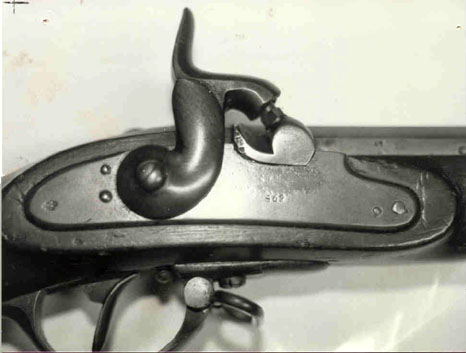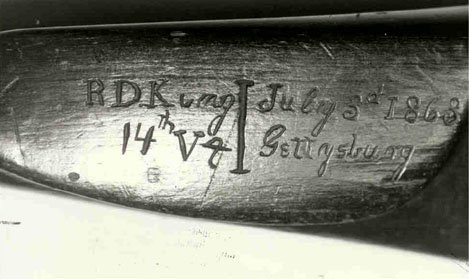

Royal D. King served with the 14th. Vt. from 18 Sept.
1862 until
mustered out on 30 July 1863.
The regiment was raised under President lincoln's call
of August 4 1862
for three hundred thousand militia to serve for nine
months. The 14th.
was attached to the defenses of Washington.
On the 20th. of April, 1863, Gen. George J. Stannard,
ws assigned to the
command of the brigade and on June 25th., the brigade
was attached to
the Third Division of the First Corps. On June 25th.,
the brigade began
the march to the North, which ended at Gettysburg.
By June 30th. it had
reached Emmettsburg, Maryland, having marched one
hundred twenty miles
in six days, and gaining a day on the First Corps.
The next day's march
was made with quickened pace, for the sound of guns
to the north told
that a battle was going on and they were needed. The
regiment arrived
late on July 1, and bivouacked in a wheat field to
the left of Cemetary
Hill. The severe march resulted in the loss of two
hundred and
twenty-two men who had been compelled to fall out.
There were five
hundred men in ranks on July 2nd.
Late in the afternoon, the brigade was called into
action on the left
center, to repel the attack of Gen. A. P. Hill. A
battery was in peril
and was saved as the Fourteenth double-quicked to
its rescue.
In the opening cannonade of the third day, the Fourteenth
had several
non-commissioned officers and men killed by the explosion
of a battery
caisson, near which they were lying. Colonel Nichols
obtained permission
to move his regiment forward about ten rods from the
main line, where
they lay during the terrific cannonade of the third
day. When the gray
line of Pickett's massive charge, seventeen thousand
strong, moved down
upon the position of the Fourteenth, they lay concealed
on the ground,
until the line was within sixty yards. The men rose
at command and gave
a staggering and unexpected volley in the face of
the charging column.
the direction of the advancing charge was changed,
and swung off to the
north, until their right flank was beyond the right
of the Fourteenth.
it was at this time that General Stannard's quick
eye saw his chance for
a flank movement, and delivered it with such fatal
effect upon Pickett.
The Fourteenth moved a short distance by the flank
to the north, and
obliquely from the main line. The Thirteenth, followed
by the Sixteenth,
changed front on the first company and moved out at
right angles from
the line and charged forward. The Fourteenth kept
up a rapid fire at
close range and closed up the pen in which Pickett's
right wing was
caught and crushed.
General Doubleday, in his official report, says of
these troops, which
had never been in action before: "These movements
were executed in open
field, under very heavy fire of shell, grape and musketry,
and were
performed with the promptness and decision of battalion
drill." The
losses sustained by the Fourteenth in this engagement,
were the largest
in the brigade. Nineteen were killed in action; nine
died from wounds
received in action; total, twenty seven. The wounded
numbered
seventy-four.
Vermont does well to preserve the names and deeds
of her soldiers in
the Civil War among her most precious archives, that
the spirit of her
sons, more immortal than their deeds, may be preserved
to future
generations. such were the young men of Vermont in
1863.
The average age of the regiment was a fraction over twenty-five years.
Royal D. King was 39 years old when he mustered out
on July 30, 1863.
His occupation was listed as a Farmer. He had blue
eyes and brown hair.
The above taken from a history of the 14th. Vt. by
Rev. William S.
Smart, D. D. Chaplain Fourteenth Regiment and was
supplied by James
Cameron.